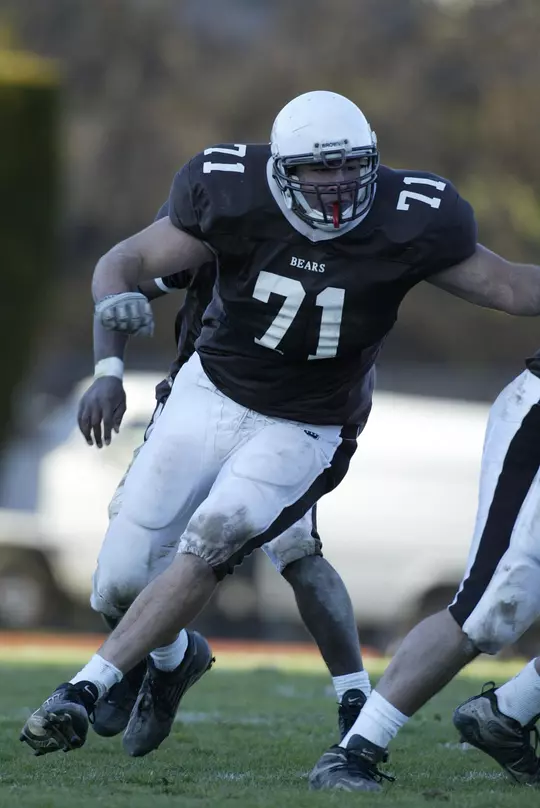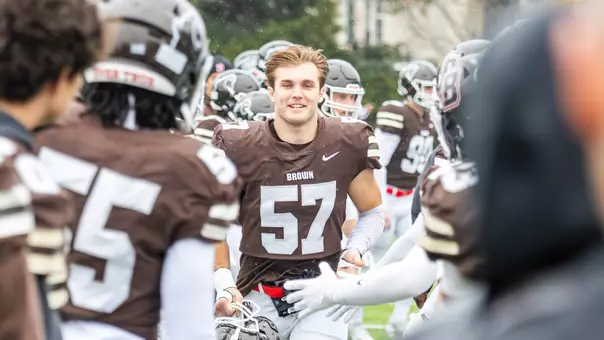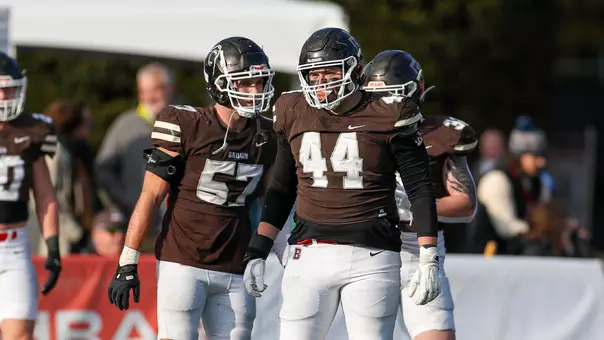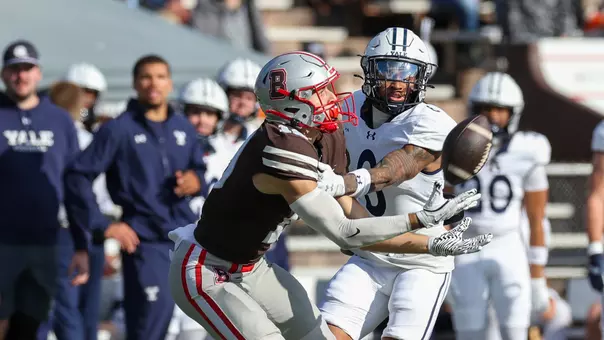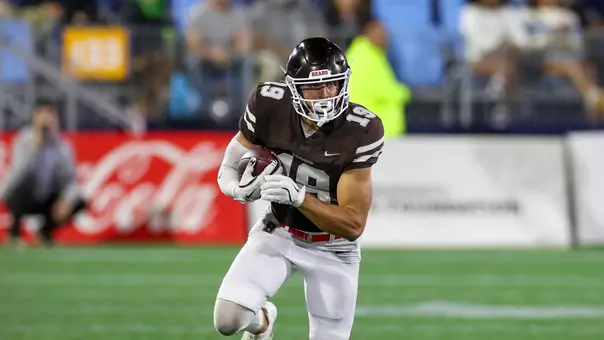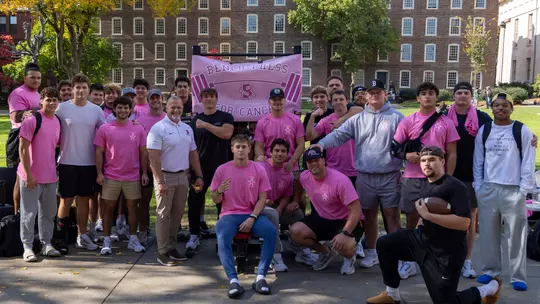
From the Main Green to The Miriam Hospital: Bench Press for Cancer’s Impact at Brown and Beyond
10/24/2024
by: Linus Lawrence '25
On Monday, students, faculty and staff walking along the Main Green were met with a curious sight outside of Sayles Hall: members of the Brown football team dressed in pink t-shirts and surrounding a live bench press station which they urged people to put to use.
The players proudly chanted the number of each rep a participant completed, while grinning friends filmed nearby and observers gazed on — their faces painted with an expression somewhere between bewilderment and amazement. Even those working on the Green offered encouragement, with one onlooker shouting, “You can get to 20!” as a student struggled through his impromptu workout.
For some who wandered by, the setup may have seemed a sort of anomalous amusement. But for Brown Football, Brown University, and the city of Providence, every rep taken at Bench Press for Cancer — an annual event celebrating its eighteenth consecutive year of operation — means repping a much bigger cause.
“Once you’re involved with the event, and you see it and you participate in it, you see how many people come by and say, ‘I lost my sister to cancer,’ or ‘My dad just passed, thanks for doing this,’” said coach Paul Frisone, Coordinator of Football Operations & Player Development, who has been with the team for 25 seasons. “I’d be hard pressed to find someone who hasn’t lost someone (to) cancer or been really impacted by it.”
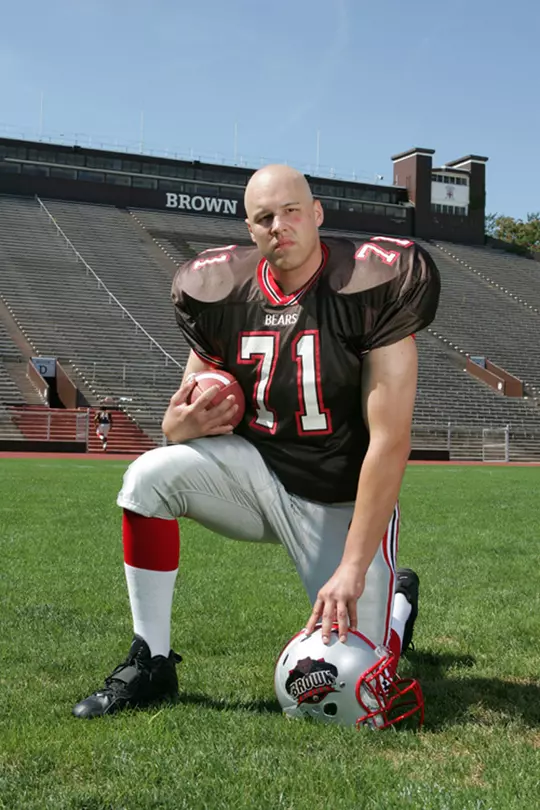
“Passion and Responsibility”
As Frisone would explain to students approaching the donation table, the event’s origins stem from the story of former co-captain and offensive lineman Lawrence Rubida ’05. During a practice in spring 2004, Rubida notified the team trainer of lingering discomfort in his hip, thinking he had a hip pointer or hip flexor strain. Instead, an MRI revealed a massive tumor, and Rubida was diagnosed with Ewing’s sarcoma: an extremely rare, but extremely aggressive bone cancer.
“We had come out of the season, and everybody’s banged up and hurting. You have overall football pains,” said Jermaine Griffin ’04, Rubida’s friend, teammate and senior-year housemate. “We didn't expect to hear from Lawrence that what he thought he experienced as just soreness would be this rare cancer that many had never heard of before.”
“It hit us hard,” Griffin continued. “We wanted to do whatever we could to help immediately. We knew that he had a pretty tough battle in front of him, and he was gonna fight, but he needed the community to help him out.”
The team, together with fraternity Theta Delta Chi, began fundraising efforts in the fall, including selling bracelets marked with his mantra, “Never Quit,” in the style of the then-popular “Livestrong” bracelets. The money was put into the “Lawrence Rubida Trust,” used to support Rubida financially while he dealt with medical and travel bills, as well as to raise money for research.
“There was a real willingness to say, ‘we can’t fix this, we don’t know how to fix it…but how do we honor him?’” Frisone said.
Even with the low chance for survival, Rubida tried to stay true to his words and never quit.
“The percentage that the doctors gave him for survival was fairly low,” Griffin said, “but he kind of laughed at it and said, ‘you know what, this is a better percentage than the chance I had to get into Brown.’ He looked at it as just one of those curveballs that life throws at you.”
“There were times where he was beaten down, and he could have just given up at that point,” Griffin continued, “but he kept waking up and fighting because he knew he had all these people rallying around him.”
Rubida’s condition eventually worsened as more tumors were discovered. His teammates and coaches visited him while he received treatment at Stanford, and he was named a captain for the 2004 season which, in Griffin’s words, felt “dedicated to Lawrence’s fight against cancer.”
After a nine-month, hard-fought battle, Rubida passed away on January 29, 2005.
“Time gives you perspective,” said former captain and fellow offensive lineman Will Burroughs ’05. “At the time, having a close friend and teammate diagnosed with something that ended up being terminal cancer was a little bit jarring and shocking. I think that the memory that remains is the way the football team and fraternity kind of banded around Lawrence to give him the support he needed.”
Two years later, team manager Yelena Cashion ’09 was approached by her friend Mackenzie Staffier ’08 with an idea inspired by another collegiate football team’s Bench Press for Cancer. Cashion recognized the opportunity to support a cause which was especially meaningful both for the program and for her on a personal level, as her late step-mom was battling breast cancer at the time.
“It was this sort of dual passion,” Cashion explained. While it was almost three years since Rubida’s passing, “a lot of the seniors at the time were freshmen when Lawrence was captain, so I think there was an immediate sort of passion to help out and really honor his memory. And personally, I felt this added passion and responsibility to raise funds.”
Cashion spearheaded organizing the first Bench Press for Cancer at Brown in 2007, but it was the following year that the event expanded to include multiple teams, relocated to the Main Green, and began selling t-shirts, generating enhanced excitement around campus.
One day in the V-Dub as Cashion was about to graduate, she handed off a “giant binder” with details about the timeline, marketing efforts, contacts and funds that formed what she appropriately called the “playbook of how to run the event” to a pair of players eager to lead it forward. Thus began the generational tradition which, fifteen years later, now marks a quintessential element of what it means to be a Brunonian football player.
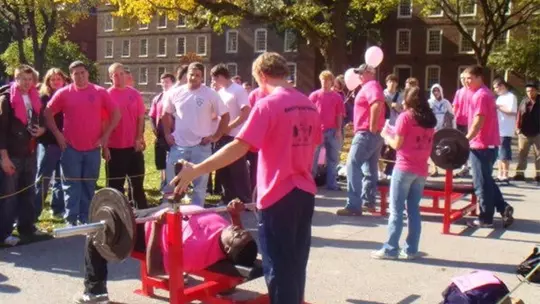
“An Opportunity to Have an Impact”
For years, the funds raised from Bench Press for Cancer went to the American Cancer Society. But in the mid-2010s, the team began a partnership with Brown University Health (formerly called Lifespan), with the funds now instead being given to cancer survivorship programs at local hospitals.
It was a conversation between longtime broadcaster Scott Cordischi and Dr. Fred Schiffman, Associate Physician-in-Chief at The Miriam Hospital in Providence and Medical Director of the Brown University Health Cancer Institute, which initiated the partnership. Cordischi recalled Schiffman saying, “If you guys ever want to consider donating to a local cause, we have a survivorship program for young adults with cancer and we could really use the help.”
When Cordischi brought the idea to Head Coach Phil Estes, they agreed to make the switch. “This was a little bit more personal to us,” Cordischi reflected.
“It felt like it was a little more real than donating to a large organization like the American Cancer Society, which obviously does great work,” said Brett Estes ’18, Coach Estes’s son and one of the primary organizers of the event during his time on the team. The local partnership “is something we get to see the impact of up close.”
The Oncology, Wellness, Lifestyle and Survivorship Clinic — or The OWLS Clinic for short — was started four years ago by Dr. Christine Duffy, Adult Cancer Survivorship Program director at the Institute. The clinic “aims to help patients diagnosed with cancer manage symptoms, maintain a healthy lifestyle, and improve quality of life during and after treatment,” according to their brochure.
“The day after you develop cancer and you live one day, you’re a cancer survivor,” Dr. Schiffman said, noting the millions of cancer survivors in the United States today. “So various programs have developed which speak to the health and well-being of those people who are cancer survivors — who are either in the middle of therapy, or just beginning therapy, or have ended therapy.”
Schiffman listed important areas of focus for survivorship programs as psychology, stability, exercise, nutrition and sexuality.
Camille Higel-McGovern, the program’s coordinator of survivorship services, explained that the clinic partially originated out of a need for the increasing number of cancer survivors living post-treatment to manage the physical and mental side-effects that remain.
“We were noticing that the specific population of people who are off-treatment were having a lot of issues and anxiety, because you go from actively treating your cancer and seeing your oncologist or your team every few weeks to now having to be more passive, and that’s a really hard transition,” Higel-McGovern said.
Patients in the program are essentially able to consult with a well-rounded group of specialists in a streamlined fashion, meeting with Dr. Duffy to discuss their symptoms before she refers them to members of the OWLS team which includes cardiologists, pulmonologists, rheumatologists and much more.
“We all meet together with the core OWLS group and we discuss every single patient that was seen,” Duffy explained. “We basically come up with a personalized plan for them in terms of how to help them going forward.”
Cancer survivors often “have difficulty getting in to see specialists, or the specialist doesn’t have expertise or experience working with cancer survivors, and that’s a really important part of our multidisciplinary team,” Duffy said. “All our members are experienced working with cancer survivors.”
The funds donated from Bench Press for Cancer — together with other donations to the program — are used to help fuel a wide range of supplies and initiatives, such as providing more comfortable hospital gowns to breast cancer patients, holding a Survivorship Week with access to entertainment, food trucks and giveaways, or providing meals and gifts to those dealing with financial stress during the holidays.
Another newer use of the funds is to provide patients undergoing stem cell transplants with wellness and exercise kits, including items like Therabands, stress balls, pedometers and puzzle books.
“When you’re sitting in a room by yourself for days and weeks, and you can’t leave your room because you’re getting transplants and you’re immunocompromised,” Higel-McGovern described, “a very small room can become even smaller.”
But Brown’s most direct impact on the program has been through a recently revived collaboration with the Division of Athletics and Recreation, allowing patients membership access to the Nelson Fitness Center.
“The football players, pre-COVID, became their personal trainers so to speak,” Schiffman said. “They’d work with patients, and the cancer survivors absolutely loved it.”
“We can’t say enough about how important physical exercise is after a cancer diagnosis. It’s good for your mental health, it’s good for your cardiovascular health, it’s good to help you with weight management, it’s great for anxiety, it’s great for insomnia (and) reducing cancer risk,” Duffy explained. “So we’re really happy to have the Brown program…Before COVID, we certainly had feedback from people that they found it very, very helpful.”
After the collaboration had previously been disrupted due to the pandemic, Brown is now once again providing access, beginning with a first wave of seven patients that were given memberships in July.
“Dr. Schiffman reached out to me and said, ‘Getting our cancer survivors an opportunity to work out, to stay healthy, to participate in group fitness classes goes a tremendously long way in helping their recovery,” said Ray Grant, Senior Associate Director of Athletics and Recreation. According to Grant, they’re offering a “significantly reduced rate” which is then covered by the Institute, meaning the cancer survivors aren’t paying for any part of the membership.
“We know that we have an opportunity to have an impact and make a difference in somebody’s life,” Grant said. “At the end of the day, isn’t that what we’re all here for?”
Initiatives currently in the works using the funds include the filming of physical therapy exercise and stretch videos to be put on the Institute’s website, a collaboration with Look Good Feel Better, purchase of personal oral thermometers and getting exercise equipment for transplant patients to have in their rooms.
Of course, with enough funds, the Institute’s long-term goals would be headlined by an expanded scale for the survivorship program altogether.
“It would be great if at every cancer center, there was an OWLS clinic,” Duffy said, while also describing a vision for an entire center dedicated to survivorship to serve as what Higel-McGovern termed a type of “one-stop shop.”

“That Tradition of Teamwork”
As of 2021, Bench Press for Cancer was cited as having raised about $200,000 between donations to the American Cancer Society and the Brown University Health Cancer Institute since its inception. This week’s event has thus far totaled just over $11,000.
Higel-McGovern highlighted the genuine enthusiasm she’s witnessed while attending the event in the past. “You can tell when people are doing something because they’re part of a fraternity or sorority or team sport (and) that’s what you’re supposed to be doing…as opposed to the people who are there because they really want to be there and because it’s important to them,” she said. “They were all calling people over — enthusiastic, smiling, even though it was early in the morning.”
The tradition occupies a special place in the program’s culture — partially a bittersweet tribute to a lost teammate, and partially a glowing testament to all that Brown Football strives to instill in its players: an eagerness to support one another off-the-field, a determination to work together for a common cause, and a responsibility to connect with generations of Bears past.
While stationed on the Main Green Monday, first-year offensive lineman DJ Toliver ’28 recalled Coach Frisone sharing the event’s history with a group after a recent practice. “I was like, ‘oh dang, this is very important to our team,’” Toliver said. Often, the tradition is especially important for those like Toliver who play Rubida’s former position, with Liam Halligan ’26 calling it an “O-line focused event.”
But despite the work of administrators and coaches — now led by Head Coach James Perry ’00 — done to impart this importance, the adults of Brown Football are quick to credit the players’ devotion as the fueling fire behind the event’s longevity.
“All the things we do are not led by me, it is led by our players,” Frisone said. “I can put the pieces out, but they really make this thing as great as it has been.”
Players “take it to heart,” Cordischi said. “They want to make sure that it’s successful every year, and I give them a lot of credit for that because they don’t know Lawrence, they weren’t teammates with Lawrence, but they understand how important that was…once you’re in this program, it’s a big family.”
From Brett Estes and Cashion, a sense of gratitude is expressed for those who have continued taking initiative as they once did to keep the event thriving.
“It’s a cause that everyone is attached to in some way and does care about, and then that tradition of teamwork and leadership being passed down throughout the years is what’s kept it alive,” Estes said.
“It’s so fulfilling, and it makes me so happy,” said Cashion, now fifteen years removed from handing off her playbook. “It really shows how a team can come together and have an impact on a community and rally around a cause. To see that torch has continued on through the years, I’m not surprised at all, because I think it shows the loyalty of the team — the involvement and excitement and how tight-knit it is that they weren’t gonna let that sizzle out.”
Rubida’s teammates, meanwhile, are moved by the continued force of their friend’s legacy.
“To have this every year, to raise this money is just something special,” Griffin said. “It means a lot to everyone who knew Lawrence to see this continued in his name.”
“It makes me feel proud to be a Brown alumni, and proud to be a Brown football alumni,” Burroughs said.
Perhaps above all else, the event’s sustained success serves as a celebration of teamwork — between the alumni who founded it, current players who organize it, and also within the survivorship programs it benefits.
“Taking care of patients is a team effort,” Schiffman said. “They’re seen by a radiation oncologist, a chemotherapy doctor, a surgical doctor, social worker, palliative care doctor, nutritionist — and it’s a team sport. That’s cancer care.”
As the 20th anniversary of Lawrence Rubida’s passing approaches, Bench Press for Cancer — now woven into the fabric of the football team and partnered with the Brown University Health Cancer Institute — shows no signs of slowing down.
“I just really hope that all the football players, everyone who’s organizing this…that everyone who’s involved knows the impact that it’s had on patients,” Higel-McGovern said. “It’s thousands of patients that they’ve been able to reach with these donations.”
“I think that we have made good on what we started, that every year this has never gone by the wayside,” Frisone reflected. “We made Lawrence a promise that we would do something to honor him, and it’s turned into something bigger than Lawrence.”
